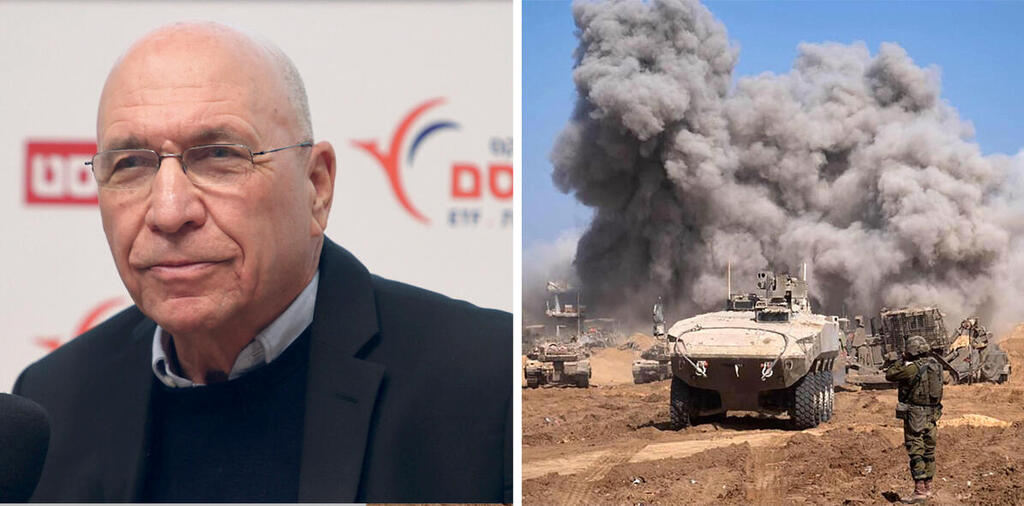
Gaza, Hezbollah, and Iran: The triple threat to Israel's economic stability
Prof. Zvi Eckstein, former Deputy Governor of the Bank of Israel and founder of the Aaron Economic Policy Institute at Reichman University, warns against the economic implications of an all-out war.
Israel is at a critical crossroads today, considering the geopolitical and military developments since the assassination of Hezbollah's second-in-command, Fouad Shakar, in Lebanon, and Ismail Haniyeh in Iran. These events have interconnected implications: the end of the war in Gaza, the return of hostages, Hezbollah's potential attack on northern Israel, and possibly a severe Iranian response on Israeli soil. It appears that Israel is on the brink of two extreme scenarios—one of calm and the other of a war that could escalate into an all-out, multi-front conflict. These contrasting scenarios have far-reaching consequences for Israel, impacting growth, the deficit, debt, employment, the state of high-tech, and every conceivable economic aspect. It is uncertain whether the country has prepared for the worst-case scenarios, if preparation is even possible. However, one can attempt to understand how the Israeli economy might deteriorate.
"We all worked on the optimistic scenario, in which a deal is reached, the war ends, and there is order in the north (Resolution 1701)," says Prof. Zvi Eckstein, former Deputy Governor of the Bank of Israel and founder of the Aaron Economic Policy Institute at Reichman University. "This scenario is set to unfold within the next month. We built the 2024 forecast based on this scenario. According to this projection, GDP will grow by only 1.5% in 2024, resulting in negative per capita growth (since the population grows by 2% annually), the deficit will jump to 8.4%, and the debt-to-GDP ratio will rise to 67%. This is the scenario we are currently in, assuming that Israel will return to 'normality' in the coming months."
He continues, "This scenario was written a few months ago, and the growth data released this Sunday aligns completely with it. It assumes that growth will begin to rise in the fourth quarter. This is an optimistic scenario in which Israel emerges from this crisis with a ceasefire. Whether Yahya Sinwar is alive or not is not particularly relevant financially, but a hostage deal is significant. By the way, this is a scenario that the military also believes is possible, which is why security personnel are working on it."
However, there is a more pessimistic scenario that receives less attention and lacks predictions—an all-out, multi-front war. "A scenario involving an Iranian threat and a Hezbollah threat, where all flights to Israel are suspended—this is a horror scenario with no forecasts," says Eckstein. "This is not the 'moderate scenario' of the Bank of Israel." He emphasizes that in a scenario of a relatively limited war, "if flights resume and everything returns to pre-June conditions (before the elimination of Shakar and Haniyeh), then we can continue. The impact of such a scenario would mean growth in 2025 beginning with a '2' prefix instead of a '4,' and the debt-to-GDP ratio would increase even more. We didn’t make a prediction for this, but it's not a catastrophe."
Eckstein describes this as a "scenario of missile attacks on the north, reaching as far as Haifa, lasting a month and a half. There would be widespread mobilization of reservists, who would also enter Lebanon, but it would end after a month and a half with an agreement based on UN Resolution 1701. That is, the outcome could be what we could achieve now without war if the hostage situation were resolved. This scenario (of a war against Hezbollah only) is unfolding now, in September. In this scenario, GDP already drops by 2.5%, the debt-to-GDP ratio reaches 75%, and there is a massive downgrade of Israel's credit rating. But this is a scenario with clear entry and exit points. It's essentially a 'small war' with Hezbollah."
The scenario that concerns Eckstein, and should concern all of us, is the multi-front one, which he calls the "horror scenario." He explains that it deserves this name "because it involves missile attacks on Tel Aviv and the suspension of flights. We may also see disruptions to port operations. This is not a continuation of the situation before the two assassinations. The economic impact could be a severe deterioration, and it’s unclear how we would recover. It's a difficult crossroads. The problem is that it’s not clear which scenario this government is leading us toward."
Eckstein admits that there are no numbers for this "horror scenario." He acknowledges that it's impossible to create such a scenario, and even if it were possible, it wouldn’t be responsible. "It also depends on who is elected President of the United States in November, what happens at the United Nations, and what occurs in The Hague. I have no idea. We didn’t run the numbers because this scenario could lead to a very rapid crash, and the uncertainty is enormous. This scenario simply puts Israel in a level of uncertainty that, as an economist, I cannot manage."
"In this scenario, we have a confrontation with Iran, and we don’t know how long it will last or how many missiles they will launch. We don’t know how many missiles the international coalition, led by the Americans, will be able to intercept alongside the Israeli Air Force. The uncertainty is so vast that you can’t start making a forecast." He adds, "Such a situation could lead to a war that mobilizes everyone and drags on for a month, two months… these are situations that don’t make sense for a country to enter into when there is another option."
Eckstein, who is considered a conservative economist, clarifies: "There is also a horror scenario that we might be able to endure. I tell people this: 'We could hold out even for a year.' But it depends on many factors, such as whether there are flights. We are talking about a type of war exhaustion," he emphasizes. "I’m not saying it’s impossible for us to continue in a scenario where the Israeli economy doesn’t last. That’s the most significant thing. I can’t make a prediction for such a scenario."
Eckstein explains that "this is not the Bank of Israel's moderate scenario—it's worse. Already today, we are in a situation where only El Al and Arkia are flying to Israel. The scenario being discussed now could be catastrophic in the sense that GDP could drop by 5% or more, with the debt-to-GDP ratio rising above 80%. But there are many questions surrounding these numbers. For example, do the Americans support us? What will happen to the Port of Haifa? Where will the ships go? There is uncertainty regarding the military scenario in terms of its success."
The question arises whether the Treasury and the Bank of Israel have prepared for such threatening scenarios. "No. They did not construct a scenario in which flights to Israel are suspended, or where we face a significant missile threat from Hezbollah and Iran. They created a scenario where the current situation continues, and they wrote it before the two assassinations. What they wrote then was the worst-case scenario at that time. And it’s a scenario that did not include a northern front or Iran."
"But what's on the table right now is the possibility of Iran attacking Tel Aviv—it's Iran and thousands of missiles. I don’t know how to make an economic forecast for such a situation. The unclear issue now is how the government is leading the country into this situation. Bringing the country to this point is unlikely, but it can certainly happen," he concludes.















